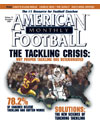AMERICAN FOOTBALL MONTHLY THE #1 RESOURCE FOR FOOTBALL COACHES
Article CategoriesAFM Magazine
|
Mental Toughness: Quiet the Mindby: Jim Rettew© More from this issue How often have you heard these? "We choked today." "We started out flat." "We play down to our competition." Or these…"We were in the zone." "Things just clicked." "It was as if I knew what was about to happen." All of these statements reflect on a team's mental performance...how the brain affects outcome. Many times, a restless brain gets in the way of performance. Your body obeys dual voices from your brain. One of the voices is the strong silent type. Your body carries out quiet instructions from the brain. When this happens, you usually play in the zone. The other is a chatty, negative voice. It's parental, like a strict father. It's never happy, and it lets you know it. It degrades you, globalizes negative events, is shallow and sensitive. Think of the process of trying to make a tackl....The full article can only be seen by subscribers. Subscribe today!
|
|
|||||||
| HOME |
MAGAZINE |
SUBSCRIBE | ONLINE COLUMNISTS | COACHING VIDEOS |
Copyright 2025, AmericanFootballMonthly.com
All Rights Reserved





